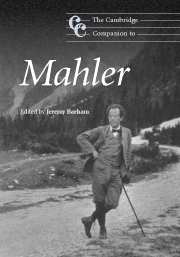Book contents
- Frontmatter
- Introduction: Marginalia on Mahler today
- PART ONE Cultural contexts
- PART TWO Mahler the creative musician
- PART THREE Mahler the re-creative musician
- PART FOUR Reception and performance
- 12 Issues in Mahler reception: historicism and misreadings after 1960
- 13 The history of the International Gustav Mahler Society in Vienna and the Complete Critical Edition
- 14 Musical languages of love and death: Mahler's compositional legacy
- 15 Mahler conducted and recorded: from the concert hall to DVD
- 16 New research paths in criticism, analysis and interpretation
- Appendix: selected discography
- Notes
- Bibliography
- Index
16 - New research paths in criticism, analysis and interpretation
from PART FOUR - Reception and performance
Published online by Cambridge University Press: 28 September 2011
- Frontmatter
- Introduction: Marginalia on Mahler today
- PART ONE Cultural contexts
- PART TWO Mahler the creative musician
- PART THREE Mahler the re-creative musician
- PART FOUR Reception and performance
- 12 Issues in Mahler reception: historicism and misreadings after 1960
- 13 The history of the International Gustav Mahler Society in Vienna and the Complete Critical Edition
- 14 Musical languages of love and death: Mahler's compositional legacy
- 15 Mahler conducted and recorded: from the concert hall to DVD
- 16 New research paths in criticism, analysis and interpretation
- Appendix: selected discography
- Notes
- Bibliography
- Index
Summary
This composer, then, was really two composers, one romantic, the other modern.
Among composers of comparable reputation, Mahler's output is quite concise in quantity and limited as to type. Its inverse proportion to commentary is correspondingly striking. In recent years, more than with most composers, literature about literature has become an increasingly pressing concern in specialist publications on Mahler. Partly this is because of the peculiarly intense relationship between the composer's music and certain commentators. Deryck Cooke's views have acquired for many an added interest in that he is also the best-known and most widely accepted of those who have ‘finished’ the Tenth Symphony. Henry-Louis de La Grange has worked a sea-change in the way that Mahler has been perceived in France. Adorno's interpretation has steadily acquired an interest in its own right: his Mahler is virtually a separate entity from the composer Mahler, a forerunner and commentator who illuminates the world-view that is expounded systematically and cumulatively from Dialektik der Aufklärung to Negative Dialektik.
None of these can unequivocally be called an analyst. Cooke perhaps comes closest to the popular image in that he comments directly on specific works, and makes some effort to link discussion with formal categories that for concert-goers are staples of old-fashioned programme notes. La Grange behaves in a similar fashion on a grander scale. His sections on works, however, tend to be a special case of the massive documentation of reception history that is a key feature of his biography.
- Type
- Chapter
- Information
- The Cambridge Companion to Mahler , pp. 262 - 274Publisher: Cambridge University PressPrint publication year: 2007



